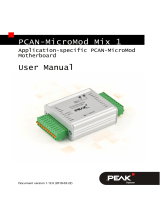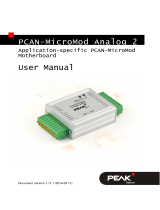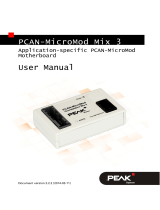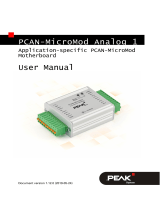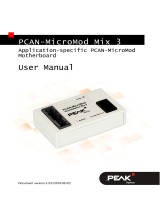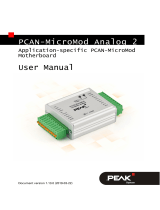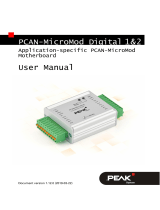Page is loading ...

PCAN-MicroMod Mix 1
Application-specific PCAN-MicroMod
Motherboard
User Manual
Document version 1.11.1 (2014-03-11)

PCAN-MicroMod Mix 1 – User Manual
2
Products taken into account
Product Name Model Part number
PCAN-MicroMod Mix 1 Including casing and
PCAN-MicroMod
IPEH-002202
PCAN-MicroMod Configuration Version 2.5
(Windows software)
CANopen® and CiA® are registered community trade marks of CAN in Automation
e.V.
All other product names mentioned in this document may be the trademarks or
registered trademarks of their respective companies. They are not explicitly marked
by “™” and “®”.
© 2014 PEAK-System Technik GmbH
PEAK-System Technik GmbH
Otto-Roehm-Strasse 69
64293 Darmstadt
Germany
Phone: +49 (0)6151 8173-20
Fax: +49 (0)6151 8173-29
www.peak-system.com
info@peak-system.com
Documen
t version 1.11.1 (2014-03-11)

PCAN-MicroMod Mix 1 – User Manual
3
Contents
1 Introduction 4
1.1 Properties at a Glance 4
1.2 Prerequisites for Operation 6
1.3 Scope of Supply 6
2 Hardware Configuration 7
2.1 Modification on Nominal Supply Voltages >
12 V 8
2.2 Pull-up/Pull-down Circuits for the Digital
Inputs 9
2.3 Measuring Range Extension of the Analog
Inputs 11
3 Operation 12
3.1 Port Assignment 12
3.2 Configuration Program 13
3.2.1 System Prerequisites 13
3.2.2 Installing the Program 14
3.2.3 Creating a Configuration 14
3.2.4 Applicable MicroMod Services 15
3.3 Status LEDs 16
3.4 Several MicroMods on the CAN Bus 16
4 Technical Specifications 18
Appendix A CE Certificate 21
Appendix B Dimension Drawing 22

PCAN-MicroMod Mix 1 – User Manual
4
1 Introduction
The motherboards for PCAN-MicroMod provide an application-
oriented environment. Typical characteristics of this product group
include a wide supply voltage range and the protective circuit for
the inputs and outputs. CANopen® firmware is available for all
PCAN-MicroMod motherboards.
The Mix 1 motherboard serves common analog and digital require-
ments and supports temperature measurement.
Note: This manual only refers to the motherboard as base for a
PCAN-MicroMod and to the standard firmware. For the PCAN-
MicroMod and the configuration program PCAN-MicroMod
Configuration, there is separate documentation.
1.1 Properties at a Glance
Completely configurable using the Windows program PCAN-
MicroMod Configuration
Communication through High-speed CAN (ISO 11898-2)
Operating voltage 8 to 26 V
Aluminum profile casing with spring terminal connectors
Top hat rail mounting option available
Extended operating temperature range from -40 to +85 °C
(-40 to +185 °F)

PCAN-MicroMod Mix 1 – User Manual
5
6 digital inputs:
• Pull-up or pull-down circuit selectable (in 3 groups)
• High state at 5 to 18 V input voltage
• Schmitt trigger behavior, inverting
• Low-pass behavior
• Parallel connection of a frequency input (for each digital
input 0 to 3) for alternative use (e.g. fast status changes,
countings)
2 temperature inputs for connection of thermistors (type
EC95F103W), measuring range 0 to 70 °C (32 to 158 °F)
2 analog inputs:
• Pull-down circuit
• Measuring range unipolar 0 to 5 V
• Resolution 10 bits
• Sampling rate 1 kHz
• Measuring range extension possible
• Protection against undervoltage and overvoltage
2 digital/frequency outputs:
• Fast low-side switches, max. 55 V, 0.75 A
• Maximum frequency 10 kHz
• Short circuit protection
Status LEDs for power supply and digital output

PCAN-MicroMod Mix 1 – User Manual
6
1.2 Prerequisites for Operation
Power supply in the range of 8 to 26 V DC
For creating and transferring configurations: computer with
Windows 8, 7, Vista, XP (32-bit or 64-bit) and a CAN interface
from the PCAN series
1.3 Scope of Supply
PCAN-MicroMod
PCAN-MicroMod motherboard in casing including mating
connectors
PCAN-MicroMod Configuration for Windows
Manual in PDF format

PCAN-MicroMod Mix 1 – User Manual
7
2 Hardware Configuration
You can customize the motherboard by modifying the hardware.
The following subsections contain descriptions about possible
modifications.
Accessing the Motherboard
In order to carry out the modifications described in the following
sections, unscrew the lid of the casing and pull off the MicroMod
from the motherboard.
Attention! Electrostatic discharge (ESD) can damage or destroy
components on the motherboard or the PCAN-MicroMod. Take
precautions to avoid ESD when handling the boards.
Remounting the MicroMod
When you remount the MicroMod, take notice of the white triangu-
lar marks on each the motherboard and the MicroMod (upper left
corner). These marks must align.
Figure 1: Positioning of the MicroMod

PCAN-MicroMod Mix 1 – User Manual
8
2.1 Modification on Nominal Supply
Voltages > 12 V
If you want to supply the Mix 1 motherboard with a nominal voltage
+U
b
> 12 V (usually 24 V), then you must do the following
modification:
1. Equip the unpopulated position D6 with a reference diode
BZV55C12 (package SOD-80).
Figure 2: Position D6 (top side of the PCB)
2. Replace the 0-Ohm resistor on position R33 with a resistor of
1.6 kΩ (package S1206).

PCAN-MicroMod Mix 1 – User Manual
9
Figure 3: Position R33 (bottom side of the PCB)
Note: You do not need to consider voltage fluctuations that
might occur. A modification isn't required in that case. Exam-
ple: In the automotive sector up to 18 V may occur at a nominal
voltage of 12 V.
2.2 Pull-up/Pull-down Circuits for the
Digital Inputs
At delivery the digital inputs are set to pull-up circuits. You can set
them to pull-down circuit in groups. This is done by repositioning
resistors.
Digital inputs Pull-up (+U
b
)
*
Pull-down (GND)
DIn 0
R31 (2.7 kΩ) R12 (2.7 kΩ)
DIn 1 and DIn 2
R53 (0 Ω) R55 (0 Ω)
DIn 3 to DIn 5
R54 (0 Ω) R56 (0 Ω)
*
Setting at delivery

PCAN-MicroMod Mix 1 – User Manual
10
Figure 4: Positions R31, R53/R55, R54/R56 (top side of the PCB)
Figure 5: Position R12 (bottom side of the PCB)
Attention! Double-check for inadvertent short circuits after
altering the setup, especially at positions R53/R55 and R54/R56.

PCAN-MicroMod Mix 1 – User Manual
11
2.3 Measuring Range Extension of the
Analog Inputs
You can extend the measuring range of each analog input to a
higher maximum voltage than 5 Volts by using a voltage divider. On
delivery of the motherboard the resistor positions R30 and R43 on
the bottom side of the PCB are not equipped. By inserting a resistor
R
x
(package S0805) with a value calculated with the following for-
mula the measuring range is extended to the desired maximum
voltage U
MB
.
)V5U(
1
V5
U
2400
R
MB
MB
x
>
−
Ω
=
Analog
input
Insert R
x
on position
AIn 2 R30
AIn 3 R43
Figure 6: Positions R30 and R43 (bottom side of the PCB)

PCAN-MicroMod Mix 1 – User Manual
12
3 Operation
3.1 Port Assignment
The motherboard has two connectors, J1/2 on the left and J3 on the
right. The port assignment is as follows:
Figure 7: Ports of the Mix 1 motherboard
Port name
J1/2
Function
+U
b
Operating voltage 8 - 26 V DC
See also section 2.1
Modification on Nominal Supply
Voltages > 12 V
on page 8.
GND Digital ground
CAN_L
CAN_H
Differential CAN signal
N/C Not connected
NTC 0
NTC 1
Connection thermistor
(against AGND)
AIn 2
AIn 3
Analog input
AGND Analog ground

PCAN-MicroMod Mix 1 – User Manual
13
Port name
J3
Function
GND
GND
Digital ground
FOut 2
FOut 0
Frequency output
DIn 5
DIn 4
Digital input
DIn 3
DIn 2
DIn 1
DIn 0
Digital input, frequency input parallel
3.2 Configuration Program
In order to create and transfer MicroMod configurations the Win-
dows software PCAN-MicroMod Configuration is used. This section
covers basic points about installation and use of the program with
the Mix 1 motherboard.
You'll find detailed information about the use of PCAN-MicroMod
Configuration in the related documentation which is invoked via the
program (e.g. with F1).
3.2.1 System Prerequisites
Windows 8, 7, Vista, XP (32-bit or 64-bit)
Computer with CAN interface of the PCAN series (for transfer-
ring a configuration to the PCAN-MicroMod via CAN)

PCAN-MicroMod Mix 1 – User Manual
14
3.2.2 Installing the Program
Under Windows install the program from the supplied CD. Start the
corresponding installation routine by using the CD navigation going
to Tools > PCAN-MicroMod Configuration 2.5.x.
3.2.3 Creating a Configuration
When you
start creating a new configuration in PCAN-MicroMod
Configuration, the Board Type dialog box appears in order to select
the type of the used motherboard. The necessary settings are
explained in the following.
Figure 8: PCAN-MicroMod Configuration: selection of the Mix 1 motherboard
Board Type: PCAN-MicroMod Mix 1
Module No: 0
The module number of the MicroMod on the Mix 1 motherboard is
set to 0 at delivery and is relevant if you want to configure more
than one MicroMod on the same CAN bus. See also section 3.4
Several MicroMods on the CAN Bus
on page 16.

PCAN-MicroMod Mix 1 – User Manual
15
Bitrate MicroMod: 500 kbit/s
At delivery the MicroMod is set to a bit rate of 500 kbit/s. A change
of this setting will take effect after sending the completed configura-
tion to the MicroMod.
Note: For the first transfer of a configuration to the module it
must be integrated in a CAN network with a bit rate of
500 kbit/s.
3.2.4 Applicable MicroMod Services
The mo
therboard's inputs and outputs are controlled by the servi-
ces of the MicroMod. The following table shows the assignment of
the motherboard functions to the MicroMod services.
Function on motherboard Port name Access with MicroMod service(s)
Digital input DIn 0 … DIn 5
Digital Input
Digital Function
Rotary Encoder
Frequency input (parallel to
channels DI 0 to DI 3)
Frequency Input
Temperature measurement
(input values are anti-
proportional to the
temperature)
NTC 0, NTC 1
Analog Input
Curve
Analog input AIn 2, AIn 3
Analog Input
Curve
Analog Hysteresis
Frequency output (for
higher-frequency status
changes)
FOut 0, FOut 2
PWM and Frequency Output
LED DOut 7 DOut 7
Digital Output

PCAN-MicroMod Mix 1 – User Manual
16
3.3 Status LEDs
The motherboard including the MicroMod has three LEDs with the
following status indications:
LED Indication
Power (green) Power is applied.
DOut 7 (red) Is linked to the digital output DO 7 of the MicroMod and
can be configured freely.
Activity (red) Status of the PCAN-MicroMod:
blinking at 1 Hz normal operation
blinking at 2 Hz invalid or no configuration
blinking at 5 Hz configuration mode
continuously on
internal MicroMod error
3.4 Several MicroMods on the CAN Bus
If you want to use several MicroMods on the same CAN bus and
want to configure them, each one needs its own module number.
That way the MicroMods are distinguishable for the program PCAN-
MicroMod Configuration.
The module number is set on the MicroMod by solder jumpers and
lies in the range of 0 to 31. At delivery each MicroMod has the
module number 0.
During normal operation of the PCAN-MicroMod, the module
number has no effect on the CAN communication.
For setting the solder jumpers on the MicroMod unscrew the top of
the casing and remove the MicroMod from the motherboard. Please
find further information about the assignment of module numbers
in the separate manual for the PCAN-MicroMod.

PCAN-MicroMod Mix 1 – User Manual
17
Attention! Electrostatic discharge (ESD) can damage or destroy
components on the motherboard or the PCAN-MicroMod. Take
precautions to avoid ESD when handling the boards.
Remounting the MicroMod
When you remount the MicroMod, take notice of the white triangu-
lar marks on each the motherboard and the MicroMod (upper left
corner). These marks must align.
Figure 9: Positioning of the MicroMod

PCAN-MicroMod Mix 1 – User Manual
18
4 Technical Specifications
Power supply
Operating voltage +U
b
8 - 26 V DC (±5 %)
Current consumption max. 200 mA, typ. 35 mA at 12 V w/o load
Ripple 5 V < 50 mV (U
b
= 12 V, 200 mA load)
Ripple analog < 20 mV
Reverse-polarity protection extant; can get ineffective by the wiring with other
CAN nodes (danger of destruction of electronic
components)
Digital inputs
Count 6
Switching thresholds UIH = 4 V; UIL = 3 V, contact or logic level
Input impedance
2.7 kΩ
Open input Pull-up, optionally pull-down (in groups)
Overvoltage protection extant
Low-pass f
g
= 7 kHz
Special feature Frequency inputs of the PCAN-MicroMod parallel
(only DIn 0 to DIn 3)
Digital/frequency outputs
Count 2
Maximum frequency 10 kHz (details: see user manual for the
PCAN-MicroMod)
Type Low-side
Voltage proof < 55 V
Output current 0.75 A (constant current)
Short circuit protection extant; short-circuit current: 1.2 A

PCAN-MicroMod Mix 1 – User Manual
19
Analog inputs
Count 2
Measuring range 0 to 5 V, extendable
Resolution 10 bits
Sampling rate 1 kHz
Source impedance
< 5 kΩ
Overvoltage protection extant
Low-pass f
g
= 66 Hz
Temperature inputs
Count 2
Reference sensor type Thermistor EC95F103W (e.g. RS Components part no.
151-237, form factor: bead)
1
Measuring range 0 to 70 °C (32 to 158 °F) corresponding 5 to 0 V
(antiproportional)
1
Resolution ±1.0 °C (due to sensor)
CAN
Transmission standard High-speed CAN ISO 11898-2, typ. 500 kbit/s, setup
with PCAN-MicroMod Configuration (Windows
software)
Termination none
CAN ID reserved for
configuration transfer
0x7E7
Module number at delivery
(for configuration transfer)
0
Peculiarity Interference Immunity
Tests compliant to IEC 61000 and DIN EN 61326
Surge ±500 V (specification industrial sector: ±1 kV)
2
Line-conducted HF
compatibility
10 V
eff
(specification: 3 V
eff
)
1
Other sensor type and measuring range on request
2
This specification could only be fulfilled with ±500 V due to the available space.
Therefore, the motherboard should be used with a local power supply.

PCAN-MicroMod Mix 1 – User Manual
20
Environment
Operating temperature -40 - +85 °C (-40 - +185 °F)
Temperature for storage
and transport
-40 - +100 °C (-40 - +212 °F)
Relative humidity 15 - 90 %, not condensing
Ingress protection
(IEC 60529)
IP20
EMC DIN EN 61326-1:2013-07
EC directive 2004/108/EG
Measures
Casing size (incl.
connectors)
55 x 68 x 24 mm
See also dimension drawing in Appendix B on page
22
Weight 109 g
/
